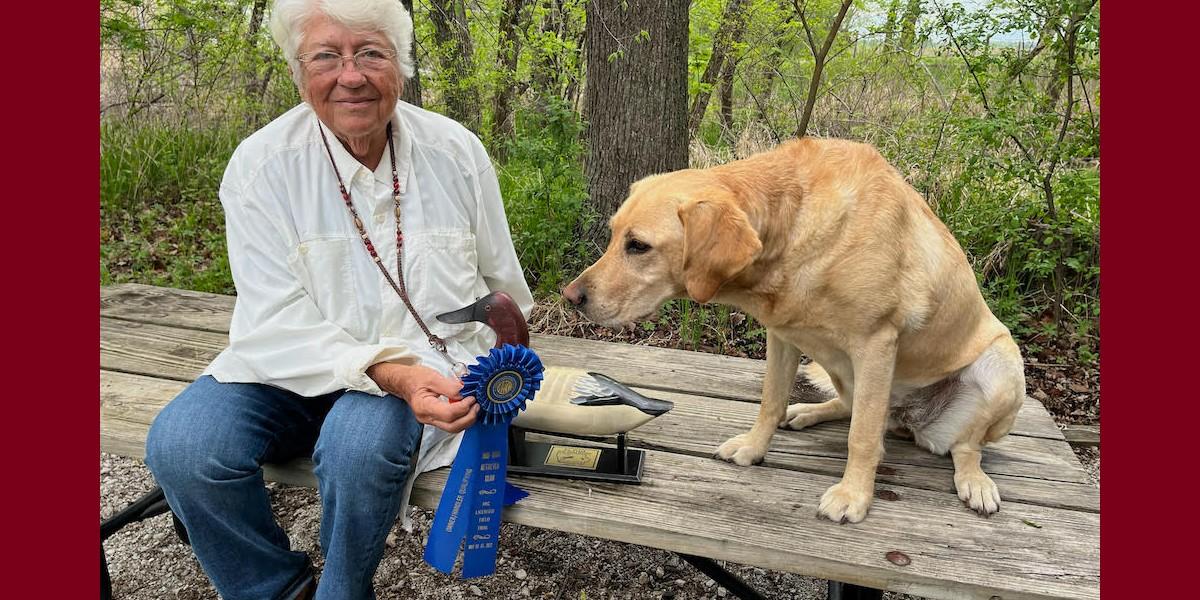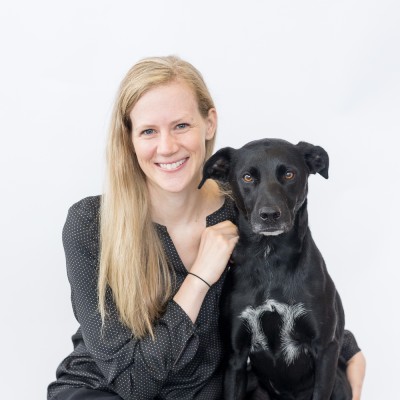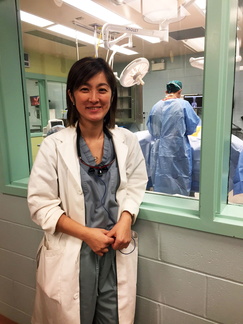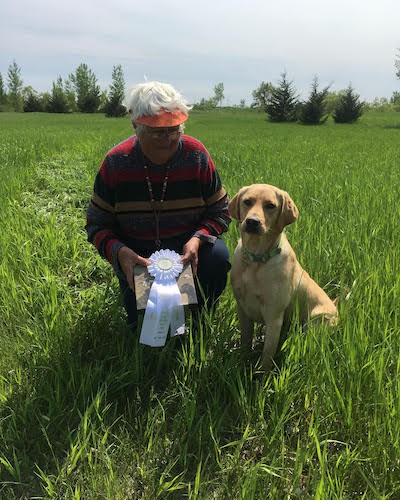Zee overcomes adversity to win
Veterinarians give a Labrador retriever a chance to compete, and the dog runs away with it!

Veterinarians give a Labrador retriever a chance to compete, and the dog runs away with it!
Veterinarians give a Labrador retriever a chance to compete, and the dog runs away with it!
With over 40 years on the highly competitive field retriever circuit, Marjie and Chuck Mize know how to select and nurture retrievers. With three American Kennel Club Amateur field champions and one Open Class field champion to their credit, their experienced eyes can spot a dog with potential. Zee, their currently four year-old “star” pupil, was no exception. Early on the registered Labrador retriever displayed the athleticism and demeanor required to win.
“We train once a day, six days a week,” Marjie says. “We work hard because there are no second chances in a competition. Too many faults or a single disqualifying behavior, and your dog is out. And Zee did everything we asked of her and more.”
Then in 2019 at a “derby” competition for young dogs in central Minnesota, a veterinarian friend overheard Zee coughing. “You should get Zee looked at” was the advice Marjie remembers hearing from the vet. Zee’s prospects were about to dim.
Their local veterinarian referred Zee to the University of Minnesota Lewis Small Animal Hospital. The Spirit Lake, IA couple drove to St. Paul–hoping for the best, fearing the unknown. From running hard through tall grass to swimming across open water, and covering everything in between, it’s easy to imagine how a hard-working retriever could inhale foreign material into their lungs.

Upon arrival, Dr. Amelia Campbell, then a hospital resident, ordered X-rays of Zee’s lungs, which revealed several masses in the left lung. “This finding raised immediate concern for blastomycosis infection,” Campbell recalls. “While not very common, the Upper Midwest is where blasto is most often found and our hospital has something of a reputation for successfully treating them.” A urine test confirmed the infection.
A blastomycosis infection is caused by inhaling fungal spores. The fungus lives in soil, especially sandy, alkaline soil. Most infections occur in dogs that go to forested or lake environments in our area, particularly those dogs that dig in soil. Dogs cannot directly transmit the disease to humans or vice versa, so it is not a zoonotic disease. The infection starts in the lungs. Coughing, fever, and difficulty breathing are the most common symptoms. With advanced infections, veterinarians see enlarged lymph nodes, draining tracts coming out of the skin, pain from bone infection, and other complications. With severe infection, blastomycosis is often life-threatening.
Dr. Campbell prescribed medication that cleared the infection from Zee’s body. Unfortunately, the infection had eaten large holes–called bulla–in her lungs. “This is a rare complication of a previous blastomycosis infection,” Campbell says. “If a bulla remains in the lung, there is a risk of spontaneous rupture of the bulla, causing air leakage out of the lungs and into the pleural space (called a pneumothorax), which can be quickly fatal.”

The Mizes and Zee are often far from emergency veterinary care, so the risk of sudden death from a pneumothorax was high. Campbell called in her colleague, veterinary surgeon, Dr. Shiori Arai, who was confident that she could remove the damaged lung tissue to reduce the risk of sudden death.
“We spent some time going over the pros and cons of surgery,” Dr. Arai remembers. “Surgery likely would mean the end of Zee’s competitive career. They were devastated. But they felt they had to do the right thing for Zee and didn’t want to take a risk of a lethal incident.”
Going into surgery, Dr. Arai wasn’t certain how much of Zee’s lung would need to be removed. But the Mizes remained firm in their decision to do what was best for Zee’s life. “We talked in terms of removing half of the left lung, but in the end we removed all of it to give the best shot in one surgery.”
The surgery went well, thanks in part to Dr. Arai’s use of an endo-GIA. “This surgical stapler allows us to close large vessels and bronchi, and transect tissues in a few grips. It helped reduce our surgical and anesthesia time for Zee.”
Zee returned home with a strong chance at life, but an uncertain future as a competitive retriever. Then COVID swept the world and competitions were suspended. This gave Zee time to heal and more importantly, time to ease into training and regain her physical fitness.
“All retrievers have some degree of prey instinct,” Marjie Mize says. “In the very best, their prey instinct overwhelms everything else. And that fits Zee to a T.”
There is no getting around the fact that with half the lung capacity, Zee is at a disadvantage. During a competition, three birds are simultaneously dropped in front of the dog from 100 to 300 yards away. The dogs must retrieve each of the birds and return them to the handler’s hand. A handler is restricted to using hand signals to guide the dog toward a bird.

“It’s more than a dog’s physical ability. It’s more than their enthusiasm to push through–not around–obstacles between them and the bird,” Marjie says. “And it’s more than being able to remember where the birds were dropped. A winning dog needs to be strong in all of these, and Zee has that.”
She runs and swims a bit slower than before–especially due to her diminished buoyancy–but Zee keeps going because she loves to retrieve. In early May, at a competition staged by the Mid-Iowa Retriever Club north of Des Moines, Zee won her first qualifier, putting her on a path toward a possible Amateur Field Championship.
When asked what is ahead for Zee, Marjie replied “She’ll let us know. We’re heading to a competition in Sioux Falls in June. Anything is possible again, and that’s what makes it fun.”